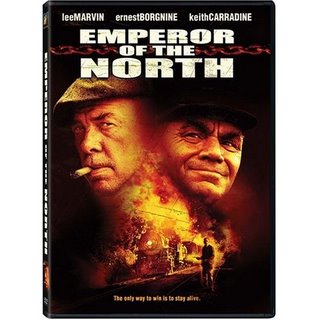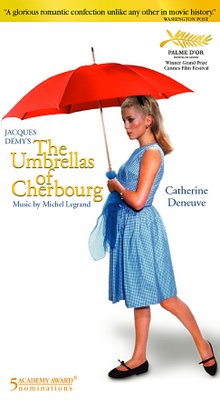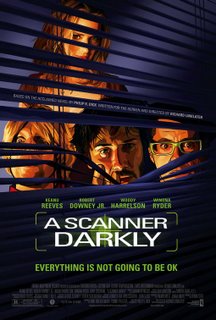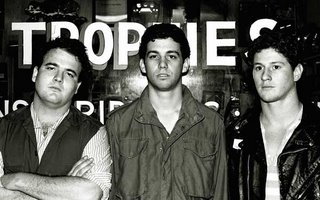 Stories that have someone transformed by single moments in their life fascinate me. Sometimes the moments are enormous while sometimes they are small enough to almost slip by. It’s one of these tiny moments that change Schultze’s life almost overnight. Schultze Gets the Blues is a completely charming German drama/comedy from 2003 that had me under its spell from the beginning.
Stories that have someone transformed by single moments in their life fascinate me. Sometimes the moments are enormous while sometimes they are small enough to almost slip by. It’s one of these tiny moments that change Schultze’s life almost overnight. Schultze Gets the Blues is a completely charming German drama/comedy from 2003 that had me under its spell from the beginning.
Schultze is a quiet man who gets “retired” from his job in a salt mine (parting gift: a salt lamp that can light up or be licked for salt). He spends his days doing not much of anything whether he’s alone or spending time with a couple of other guys who were also retired. He fishes from a bridge, he watches his buddies play chess and he plays accordion in the local polka band. Life is simple. Every day is a day of routines.
Routines change when one evening he is flipping through the radio dial and hears a form of accordion playing unlike anything he’s ever heard: zydeco! Schultze is bewitched and a tad confused by the ramped up accordion playing in the song. He tries to walk away but can’t. Soon the song is barging its way into any normal polka song that Schultze tries to play and he's cooking Cajun food for his buddies.
Schultze soon goes on a journey that he would never had noticed beginning had he not paid attention to this song on the radio. It was his nearly invisible moment but Schultze noticed it and let it change him. Sadly, I don’t think many of us notice these kinds of moments in our lives. Or, if we do notice them, we surely aren’t brave enough to let the moments take control and alter our path when we are faced with them.
That is what’s so sweet and rewarding about Schultze Gets the Blues—it is chock full of the notion of giving yourself over to the innocence of something new, anything new, no matter where the idea, the feeling or the moment leads you. To do that takes courage and Schultze might be quiet and soft spoken, but he’s got a lot of courage. And he's got a desire to play that zydeco!
There is very little dialogue in Schultze Gets the Blues and I get the feeling most of the actors aren’t professionals (at least the supporting roles)—something I actually like most of the time as it lends a realness and natural quality to a film if done right. Even with little dialogue, the film flashes by in a blur because it’s just got this magical story to it that swept me up.
Schultze Gets the Blues is one of my favorites for 2006 and is especially recommended for music lovers and romantics (or anyone else who just wants to see a/ a good movie or b/ a movie that makes you feel great to be alive!).
 I’m always ready to watch a film set among hoboes, wanderers and others lost in the void of the Great Depression. Maybe it's the Grapes of Wrath existence a lot of my relatives lived during that period? My grandpa Benton had colorful stories about riding on trains during the 1930s. So, it's not a surprise I'd take a liking to Emperor of the North with hoboes battling the railroad cops who desperately try to stop them from riding their train.
I’m always ready to watch a film set among hoboes, wanderers and others lost in the void of the Great Depression. Maybe it's the Grapes of Wrath existence a lot of my relatives lived during that period? My grandpa Benton had colorful stories about riding on trains during the 1930s. So, it's not a surprise I'd take a liking to Emperor of the North with hoboes battling the railroad cops who desperately try to stop them from riding their train.
Rail workers and train riding tramps were notorious enemies in this era. There was a savage brutality that often ended in blood spilling and even death. Early on we get to see how serious this can be as the meanest S.O.B. of the train cops—Shack (played by the great Ernest Borgnine)—takes his big hammer to a free rider's skull and he’s soon cut in half by wheel on rail.
Emperor of the North, which is based on a story by Jack London drawn from his experiences riding the rails, tells the story of such a battle between men. Lee Marvin plays A-No. 1, a tough as nails, seasoned ‘bo who decides to take on the sadistic Shack. No one has ever ridden on Shack’s No. 19 train. Nobody. The men battle wits and brawn as the train heads west. When I say battle I should include the list of weapons: fist, hammers, axes, boards, chains and wits.
The film is an odd mix of action, gritty ‘70s pulp cinema and social commentary. It works wonderfully. I loved seeing how A-No. 1 and Cigarette (an inexperienced tag-along ‘bo played by Keith Carradine) tried to ride No. 19 while Shack attempted to get rid of them any way he possibly could to save his reputation.
I also loved seeing all the hobo groups and camps talking it up with their slang, nicknames (other ‘bo names were Hogger and Hee-Haw Mike) and gambling up a storm on whether A-No. 1 is the first to ever ride the No. 19 train and live to tell about it. It was a hard life to be a tramp during the depression but the men seemed to have a code and community all their own.
Plus, these were REAL stuntmen doing something called stunts in Emperor of the North! No komputers were involved in any stunt in this movie. When you see a guy fall off a train backwards in Emperor of the North, it’s a real person risking life and limb for the sole art of making a picture better. Action films now are just a bunch of phony komputer aided scenes stripped of the danger because nothing is real. There’s something missing in the spectacle of the CGI films now because that “realness” has been lost.
Emperor of the North is just another example of a hidden gem from the 1970s. That decade had so many great films it’s unreal compared to now. Even their b-films like this were a lot of fun and more interesting than most of the pap out now. This is a fun film that has an epic train throw down from two of the all-time Hollywood tough guy actors in Lee Marvin and Ernest Borgnine and is worth seeking out.
 I’ve always meant to watch Jacques Demy’s 1964 French musical The Umbrellas of Cherbourg but never got around to it until a hot Sunday afternoon in Oklahoma. The opening straight down shot with rain falling on cobblestones as people with a variety of colored umbrellas transported me straight to France and away from the 100+ degree heatwave that exists in Oklahoma for the past few weeks.
I’ve always meant to watch Jacques Demy’s 1964 French musical The Umbrellas of Cherbourg but never got around to it until a hot Sunday afternoon in Oklahoma. The opening straight down shot with rain falling on cobblestones as people with a variety of colored umbrellas transported me straight to France and away from the 100+ degree heatwave that exists in Oklahoma for the past few weeks.
This movie feels so unmistakably French, from the vibrant colors of the Gallic interior wallpapers to the quaint narrow streets with shops such as the family umbrella shop a 16 year-old Genevieve works with her widowed mother. Genevieve is in love with Guy, a 20 year-old mechanic who her mother doesn’t approve of. The pair coo, coo and more coo every time they are together in the kind of teenage French love that looks so romantic to see on film. Ah, to be in love while a teenager in France in the late 1950s!
Problems ensue when Guy gets drafted for two years of military service and Genevieve meets a suitor who is more suave and successful than Guy. Will she wait for him to get out of his military service or will she decide to marry this other man?
The Umbrellas of Cherbourg is a musical unlike any musical I’ve seen because the cast sings every line of dialogue in the film. Every line. At first I was thinking, “I don’t know about this,” as I’m not a huge musical genre fan, but the story is so lavishly photographed, romantic and Catherine Deneuve is so beautiful as Genevieve, I got into it.
The singing and color-drenched scenes make the film feel light as air but there is a real sad, bittersweet quality to the film as it evolves. I wasn’t expecting The Umbrellas of Cherbourg to have such a powerful ending but it’s the ending that will really give this French romantic musical its staying power when I think of it.
 I’ve been eagerly waiting the release of Richard Linklater’s adaptation of Philip K. Dick’s novel A Scanner Darkly. I’m a long time fan of his novels—he’s one of the most respected, influential and interesting science fiction writers in the history of the genre—and enjoyed this version of one of his books I have not read.
I’ve been eagerly waiting the release of Richard Linklater’s adaptation of Philip K. Dick’s novel A Scanner Darkly. I’m a long time fan of his novels—he’s one of the most respected, influential and interesting science fiction writers in the history of the genre—and enjoyed this version of one of his books I have not read.
PKD’s books are often dense, convoluted and strange trips into the mental workings (or mental falling apart) of his characters—fantasy and reality are often indistinguishable in PKD’s world. You never really know what is happening and what is real in a lot of his stories. This is certainly the case in A Scanner Darkly as it’s a bizarre trip into a world of drugs and paranoia (that’s another of PKD’s favorite topics) as various characters fall to depths because of the drugs they are addicted to.
Keanu Reeves plays an undercover cop named Bob Arcter who becomes addicted to the drug “Substance D” (the “D” stands for death). It’s a highly addictive drug that a major chunk of the population is addicted to. No one knows Arcter’s identity in the police force because he wears a “scramble” suit that has over one million images of people and clothes flickering over it at all times. It’s a neat trick and one of the only overt sci-fi inventions or elements in the film, yet, A Scanner Darkly is still a sci-fi film at its core.
Arcter spends his time hanging out with fellow drug fiends in a squalid house while slowly losing more and more of his faculties and mental clarity because of his taking substance d. He takes tests at the police mental health department and talks to his boss--whose identity is also a secret as they too wear a scramble suit.
That’s the simple version of A Scanner Darkly. It’s way more complicated and intricate than that. The script incorporates a lot of PKD’s interests into it—psychology, philosophy, religion, the perception of the world around us, morality, personal choice, the paranoid state of man, the always present split personality of humans and drugs as objects of control and ruin are all given time in the story.
The film has a great cast with Robert Downey Jr. and Woody Harrelson providing some funny moments as people in Arcter’s sphere who are even more whacked out than he is. Both of these actors are known for being able to deliver an eccentric performance with the best of them and they rise to the occasion nicely. I was also so happy to see Winona Ryder make a nice return to the film world as Arcter’s “sort of” girlfriend and part-time drug dealer.
A Scanner Darkly is animated in the same way Linklater’s A Waking Life was—with each individual film frame painted over after the actors were filmed with traditional film techniques. I liked seeing the story this way as it really fuels PKD’s hallucinogenic story and takes it places that it wouldn’t have gone—the fantasy scenes for example—had it been strictly shot on film.
A Scanner Darkly is interesting, complex, dark, humorous, bleak and will make you work a little harder for your sci-fi as its not one of these aliens and effects sci-fi films—it tries to dig deep into the human mind and the objects that control and destroy us. I think Philip K. Dick would be very happy with this adaptation if he were alive.
 I'm a big fan of the TV show The Shield and was very happy to see Forest Whitaker join the cast last season. As I watched him go up against the rogue cop Vic Mackey I remembered how much I love to watch Forest Whitaker act. He's every bit the match for Mackey and Whitaker crafted a dangerous, complex, electric character to watch. This is something that Whitaker has done a lot in his career (uhm, not counting Battlefield Earth).
I'm a big fan of the TV show The Shield and was very happy to see Forest Whitaker join the cast last season. As I watched him go up against the rogue cop Vic Mackey I remembered how much I love to watch Forest Whitaker act. He's every bit the match for Mackey and Whitaker crafted a dangerous, complex, electric character to watch. This is something that Whitaker has done a lot in his career (uhm, not counting Battlefield Earth).
Whitaker has also directed three motion pictures but surprisingly all of them are much lighter—and not very good—than what he usually chooses as an actor. For example, in 2004 he helmed the underwhelming Katie Holmes vehicle First Daughter and it's a predictable, sappy, not very good film pumped full of way too much saccherine. It's kind of baffling he'd choose to direct a film like Hope Floats after being in something as cool as Ghost Dog.
Here are some of my favorite films Forest Whitaker has been in that should be seen:
Fast Times At Ridgemont High (1982): Whitaker plays Rigdemont High's star football player who goes on a mauling rampage against Lincoln High after his little brother and Jeff Spicoli (Sean Penn) wreck his car and make it look like Lincoln High did the damage. It's a small role but his snorting, vicious football player is one of many memorable performances in one of the best high school comedies ever.
Platoon (1986): Oliver Stone's Vietnam epic is an enthralling look at the everyday soldier as they become lost in the psychological mayhem of war. Whitaker gets to show what kind of intense actor he will develop into in the future with his role as «Big Harold».
Good Morning, Vietnam (1987): I haven't seen this since it came out so I'm not sure it's dated well but this is a vastly different Vietnam War picture for Whitaker than what he did in Platoon. For one thing, had Robin Williams been in the gritty Platoon he would not have made it a week if he acted like he normaly does.
Bird (1988): Whitaker delivers maybe the performance of his career in this Clint Eastwood directed bio-pic of bebop jazz legend Charlie «Bird» Parker. Whitaker owns the screen in virtually every scene in the picture and even makes it look like he knows what he's doing with a saxaphone.
The Crying Game (1992): Wonderful, twisted movie from director Neal Jordan that sees Whitaker embrace another brave role as an actor. This film was kind of a cultural event picture because of a turn in the film and was the last really good film Whitaker would do for seven years.
Ghost Dog—The Way of the Samurai (1999): Whitaker broke out of the sub-par cycle in this very cool film from writer/director Jim Jarmusch. Whitaker plays a kind of urban samurai who gets mixed up in some nasty business he has to use his code to make it through. Maybe the coolest character and movie that Whitaker has ever done.
I'm hoping Whitaker's performance in The Shield will get him some interesting roles again—he deserves them! Those above are some of his better films and performances that must be seen if you like Whitaker.
 I caught Mission Impossible 3 yesterday at the dollar theatre and I confess, I spent the entire movie hoping that Philip Seymour Hoffman would get to «kill» superspy Ethan Hunt. The reason—Hunt is played by the always grinning, always annoying Tom Cruise. Heck, I was so caught up in rooting for Hoffman's bad guy I was hoping he'd off Cruise on-screen wife in the process of killing the high powered Scientologist. Kill anyone and everyone in the path to getting to Cruise/Hunt!
I caught Mission Impossible 3 yesterday at the dollar theatre and I confess, I spent the entire movie hoping that Philip Seymour Hoffman would get to «kill» superspy Ethan Hunt. The reason—Hunt is played by the always grinning, always annoying Tom Cruise. Heck, I was so caught up in rooting for Hoffman's bad guy I was hoping he'd off Cruise on-screen wife in the process of killing the high powered Scientologist. Kill anyone and everyone in the path to getting to Cruise/Hunt!
Hoffman, whose never gotten to play the bad-ass action villain, gives a snarling try of it, but it shouldn't come as a surprise to know that he fails. What? Don't tell me I spoiled the ending for you, this is a Cruise action blockbuster afterall. Maybe Hoffman can get Cruise to slum in a little movie sometime and «kill» him in that. I would be a happy robot just to watch him die in anything.
 The past couple of years has seen a spate of great musical documentaries released—New York Doll, The Devil and Daniel Johnston, Dig!, Moog, Some Kind of Monster, The Fearless Freaks and The Nomi Song are all music based docs I've seen since 2005 and liked. Add We Jam Econo to that growing list.
The past couple of years has seen a spate of great musical documentaries released—New York Doll, The Devil and Daniel Johnston, Dig!, Moog, Some Kind of Monster, The Fearless Freaks and The Nomi Song are all music based docs I've seen since 2005 and liked. Add We Jam Econo to that growing list.
Tim Irwin's We Jam Econo is the story of the San Pedro punk rock band Minutemen. Minutemen weren't really punk rock, yet still, were more punk rock than the vast majority of bands that sprung out of Southern California hardcore scene during the late 1970s/early 1980s.
The doc follows their early beginnings, going back to junior high school when D. Boon and Mike Watt met, all the way until Boon's premature death in 1985 from a car wreck. It's sad to see how commited and passionate Boon was on stage and to know it all ended much too soon.
Because of their style, kind of a punk, funk, jazz fusion beneath furious political shout outs, Minutemen never got the acclaim or due the fans of the band think they deserve. Those fans, a multitude of famous musicians, and extensive interviews with Watt and drummer George Hurley create the framework of the documentary.
The real star of this is all the performances of Minutemen in various small clubs. The songs are short bursts of raw energy that combine all these styles of music in a punk rock setting—sometimes to the dismay to narrow minded, rigid audience members who had already created a set list of what a «punk rock» band could and couldn't sound like. Nitwits.
Boon, who is a large man, dances all over the stage while singing/screaming along with Watt while Hurley pounds away and pulls of complicated drumming moves. It's a vivid look at what it was like to be in such a band during this era and shows the band in their proper element—performing on stage.
We Jam Econo is a great addition to the ever increasing library of rock history documentaries. It sheds light on a band that may have slipped off the radar to rock fans and one of the more interesting front men ever in D. Boon.
 Stories that have someone transformed by single moments in their life fascinate me. Sometimes the moments are enormous while sometimes they are small enough to almost slip by. It’s one of these tiny moments that change Schultze’s life almost overnight. Schultze Gets the Blues is a completely charming German drama/comedy from 2003 that had me under its spell from the beginning.
Stories that have someone transformed by single moments in their life fascinate me. Sometimes the moments are enormous while sometimes they are small enough to almost slip by. It’s one of these tiny moments that change Schultze’s life almost overnight. Schultze Gets the Blues is a completely charming German drama/comedy from 2003 that had me under its spell from the beginning.




